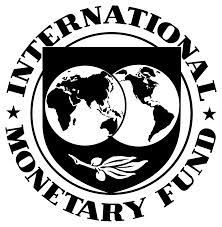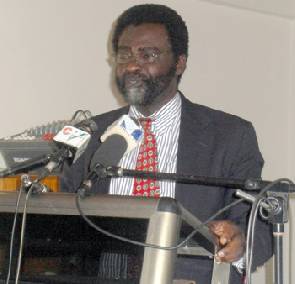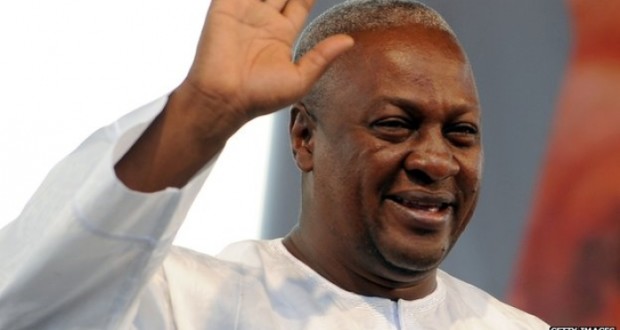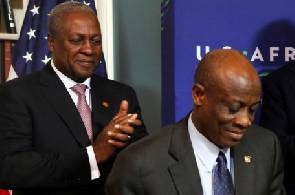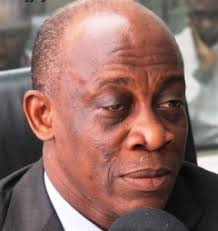 A team from the International Monetary Fund (IMF) will hit the shores of Ghana this week to discuss how the country’s ailing economy can be salvaged.
A team from the International Monetary Fund (IMF) will hit the shores of Ghana this week to discuss how the country’s ailing economy can be salvaged.
The team will engage government in negotiations and then fashion out a programme to suit the country’s needs, as well as discuss policy alternatives with the Bank of Ghana.
President John Mahama last month directed that immediate initiatives be taken to open discussions with the International Monetary Fund (IMF) and other development partners in support of Ghana’s programme for stabilization and growth.
According to President Mahama, the decision to open discussions with the International Monetary Fund was not because of the failure of government’s own homegrown solutions, but rather because of the need for policy credibility and confidence from international financial institutions, capital markets and investors for the measures being implemented to restore economic stability and growth.
“So we are going to discuss with the IMF how we can turn the deficit around quickly and create the kind of confidence even in the short-term narrative,”
The International Monetary Fund in August announced it had received a formal request from Ghana to initiate discussions on an economic programme that could be supported by the IMF.
The Deputy Managing Director of the IMF, Min Zhu in a statement said: “The Fund stands ready to help Ghana address the current economic challenges it is facing.”
“An IMF team will be sent to Ghana in early September to initiate discussions on a programme,” he added.
Ailing economy
The Ghanaian economy has been faced with some critical ailing conditions for some time now amidst rising inflation, a depreciating currency, high budget deficit amongst others.
Inflation currently stands at 15 .3 per cent, the highest rate since February 2010.
Year-on-year inflation accelerated from 14.0 percent in February mainly due to higher cost of housing, water and electricity (+43.8 percent), transport (27.3 percent), clothing and footwear (16.7 percent), health (13.4 percent), recreation and culture (13.8 percent), food and non-alcoholic beverages (8.2 percent).
The story is not different for the local currency, the cedi.
Since the beginning of the year, it has depreciated by 27 per cent against the major foreign currencies- the US dollar, British Pound and the Euro.
According to the Bank of Ghana’s financial stability report released in March this year, the Cedi’s continuous depreciation against major trading currencies, as well as the continuous hikes in inflation is having a toll on profits of banks.
Government is still struggling to deal with the country’s rising budget deficit.
Bailout opposition
Despite these challenges, some quarters have appealed to government to stay away from an IMF bailout.
The Trades Union Congress (TUC) for example has warned government to desist from any move to go to the International Monetary Fund for a bailout in the midst of current economic challenges facing the country.
The TUC’s Secretary General, Kofi Asamoah says resorting to the IMF to solve the matter will only worsen it.
He believes resorting to the IMF in previous years was a mistake that should not be repeated.
“Times are hard the prognosis on the economy is not good either but we must at this point resist the temptation to seek IMF bailout. As we stated, it is the IMF-sponsored policies that have brought us almost to the brink. No country has developed following to the advice of the IMF. Resorting to the IMF for financial support was a mistake we made in the past. We must take responsibility of this mistake and find solution to our problem.”
A former Finance Minister under the erstwhile Kufuor administration, Dr. Anthony Akoto Osei has also warned Ghanaians to brace themselves for more hardship as the country seeks a bailout from the International Monetary Fund.
“I think that we should be ready for things to be tough,” he remarked.
The implementation of IMF’s structural adjustment programme in the 80’s saw subsidies wiped, public sector jobs cut while wages kept low, moves which, however, restored economic growth.
IMF stance
But the Managing Director of the International Monetary Fund Christine Lagarde has downplayed assertions that a bailout programme from them could see Ghana go through another phase of hardship while the country tries to meet its strict conditionality in order to restore fiscal discipline and macroeconomic stability.
‘Structural adjustments? That was before my time. I have no idea what it is. We do not do that anymore. No, seriously, you have to realize that we have changed the way in which we offer our financial support. It is really on the basis of a partnership.”
But renowned economist Kwame Pianim has described government’s decision to apply for a bailout from the IMF as “a stabilising anchor’’ that will re-position Ghana’s economy for growth and macroeconomic stability.
According to him, the decision to go back to the IMF only suggests the country is faced with a structural problem that has not been addressed.
“It seems there are some structural issues that we as a country have not adequately addressed; the issue now is the lack of policy credibility,” he said
Financial analyst Sydney Casely-Hayford earlier told Citi Business News Ghana can only access $569 million as bailout from the International Monetary Fund (IMF) due to the nature of the economy.
According to him, Ghana has a special drawing right with the IMF that allows it to only access $569 million as bailout due to the underlying values of the nation’s debt and macro-economic indicators
He also revealed that per Ghana’s drawing right, it can either apply for 100% of its drawing right, double or triple the amount depending on the programme the country signs onto.
